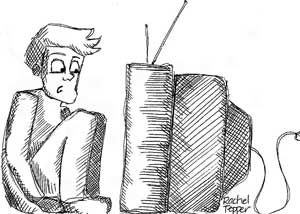 Rachel Tepper
Rachel TepperI used to think I was immune to addictive television series. I considered myself among the lucky few who managed to resist the magnetic allure of TV every season. I say all this in past tense because over the past few weeks I have quickly spiraled into a love affair with one of the nation’s favorite shows- “Grey’s Anatomy.” It started out innocently enough. My suitemate, having recently acquired the first two seasons of the medical-based drama, asked the rest of us if we were interested in watching. After discovering no one had seen a single episode, we decided it was only fair to pay homage to the rare occurrence by watching the episodes in chronological order together as a suite. Quickly, nighttime viewings became a sacred ritual we’d look forward to throughout the day. On some days, our only sense of true peace was huddling together in the glow of the show’s projection emitting from the tiny laptop screen. We’d laugh together, cry together, gasp, woot and swoon together in perfect unison. As the days passed, life inevitably began to impede on our nightly ritual and episodes were missed, private viewings were guiltily confessed, and tensions escalated. Our grades began to slip and we lost interest in extracurricular activities. Life just didn’t seem to have the same joyful spark without a steady dose of “Grey’s” each night. It was as if a small part of our existence was inextricably linked to the exhilarating roller coaster ride of emotions the show so lovingly bestowed upon us every time we pressed play, and there was nothing we could do to stop watching.
The somewhat unsettling fact is my suite’s experience is probably similar to that of the majority of people exposed to television. Be honest with yourself. I’m sure some of you would still think it impossible to be seduced by a television drama, but maybe you shouldn’t be so sure. Think of the multitudes of shows that have been obsessively followed on our campus alone-“Project Runway,” “Nip/Tuck,” “24,” “Desperate Housewives,” “Lost,” “The OC,” “American Idol” and “Grey’s Anatomy” (to name a few).
Having thought a lot about the matter, I’ve noticed some uncanny parallels between those who are addicted to particular television shows and those who are addicted to drugs. For instance, those who have been “using” for multiple seasons might find themselves anticipating their next fix and feel a genuine sense of loss when they miss an episode one week. Thankfully, modern inventions such as TiVo have made this devastating experience a thing of the past for those who are fortunate enough to have the technology. And for those in need of a quick fix due to escalated tolerance levels, an iPod and a freshly uploaded episode will instantly satisfy your between-class cravings. Let’s look at another, somewhat creepy parallel. How about when the plot takes a shockingly positive turn, say if two characters finally get together after months of anticipation, and viewers experience a sense of warmth, well-being, euphoria or contentment. Coincidently enough, all of these effects are also consequences of heroine use. And then there are the devastating repercussions of watching the season finale. The withdrawal experienced post-finale is very real and can last for a few days, weeks, or even months depending on your individual level of dependence. Ok, so maybe I’ve blown the situation a little bit out of proportion, but you can’t deny there is startling evidence to support the theory that TV these days may have an unhealthy, somewhat controlling grasp on our lives. If nothing else, it’s something to think about.
So the question is: do we embrace this nationwide addiction or do we treat it? Television companies certainly would profit from our social acceptance of this rapidly diffusing phenomenon. If the delicate concoction of drama, romance, and neatly packaged life lessons becomes any more powerful, television companies could become the equivalent of today’s tobacco companies-leeching off of consumers despite what’s in their best interest. Maybe one day we’ll have a healthy detachment from the shows we watch on TV, but until it becomes a major health issue, I say we embrace it (then again, I’m hooked on the stuff).
Marissa is a sophomore in Arts & Sciences. She can be reached via e-mail at mrfioruc@wustl.edu.